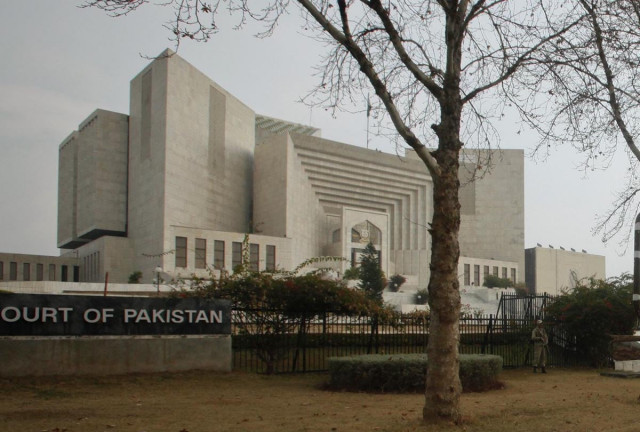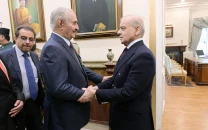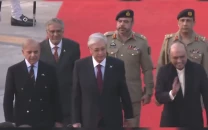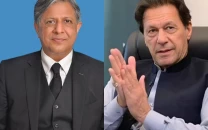‘Undefined’ suo motu parameters causing inconsistent use
Senior lawyers comment on how to regulate use; how some CJPs are more inclined to use 184 (3)

Supreme Court of Pakistan. PHOTO: REUTERS
Article 184 (3) gives the Supreme Court the power to entertain matters of public interest. It is the same 56-word article under which two prime ministers and several other state functionaries have been sent packing during the last nine years. Those state functionaries also included two NAB chairmen and, in a 2009 verdict, over 100 judges.
During the tenure of former chief justice Iftikhar Muhammad Chaudhry, the apex court also used this constitutional power to grind at the military establishment in missing persons cases.
But the scope of this judicial power has yet to be determined. This anomaly has allowed chief justices to exercise this suo motu power at their discretion and without particular regulation.
Overstepping jurisdiction: ‘SC cautious in suo motu actions since 2014’
Article 184 (3) says, “without prejudice to the provisions of Article 199, the Supreme Court shall, if it considers that a question of public importance with reference to the enforcement of any of the Fundamental Rights conferred by Chapter I of Part II is involved, have the power to make an order of the nature mentioned in the said Article”
Though the judiciary – the top court – has used this jurisdiction to curtail the powers of the legislature and the executive through its rulings, it never set parameters regarding its own use of this power.
Many lawyers accused Iftikhar Muhammad Chaudhry of being trigger-happy when it came to the use of Article 184 (3).
His successor – Tassaduq Hussain Jillani – even noted at a full court reference in honour of Chaudhry on December 11, 2013, that, “In the process of rethinking and reevaluating our role as judges, I may like to share… there is a perception shared by many that the thin line of distinction between the requirements of Article 199 and 184(3) is being blurred. There is need to determine the limits and contours of jurisdiction under Article 184(3) of the Constitution with a view to discourage frivolous petitions and to prevent the misuse of jurisdiction by vested interests.”
In contrast to his predecessor, former CJ Jilani did not entertain such constitutional petitions in his seven months as the head of the bench, but he was also unable to formulate a means of regulating the power to entertain public interest matters as he had vowed.
Panamagate saga ends: Prime Minister sent packing
On March 3, 2014, a three judge bench, headed by Justice Anwar Zaheer Jamali, hearing PTI MNA Ghulam Sarwar Khan’s election case, recommended that then-CJ Jilani form a larger bench to set parameters regarding the use of the apex court’s suo motu powers under Article 184 (3). Incumbent CJ Mian Saqib Nisar was a part of that bench.
It has still not been taken up for adjudication.
The five chief justices that have retired since March 2009 have had very different approaches towards public interest litigation.
During the tenure of Iftikhar Chaudhry, more than 450 constitutional petitions filed under Article 184 (3) were entertained. Hundreds of suo motu notices were taken during his period.
His immediate successors Justice Jilani and Justice Nasirul Mulk then adopted a policy of judicial restraint and took very few suo motu notices.
Then Justice Anwar Zaheer Jamali initiated suo motu proceedings in more than 20 cases, including one related to maladministration in the province of Sindh. The incumbent CJ has taken only five suo motu notices so far.
During the years from 2014 to 2017, the top court entertained 113, 80, 57 and 25 constitutional petitions respectively. Currently, 294 constitutional petitions filed directly in the apex court are pending. Likewise, decisions on 177 human rights cases and 59 suo motu matters are still awaited.
PTI funding needs thorough probe: SC
On June 25, 2016, SC Justice Ejaz Afzal Khan, in a case related to nonpayment of salaries to Pakistan Steel Mills employees, observed that the Supreme Court has become more conservative in exercising its suo motu jurisdiction under Article 184 (3) of the Constitution since 2014. The judge said, “We analysed our limitation…In the past where we overstepped our jurisdiction, we got caught up in the mud.” He said they had learnt from history that the apex court should remain within its Constitutional jurisdiction.
But the same old debate restarted after the Panama Papers verdict disqualifying Nawaz Sharif.
Senior lawyer Faisal Saddiqi says that the SC judgment points towards some serious issues. “First, doesn’t the procedural confusion regarding multiple judgments and different benches clearly indicate the absence of procedure regulating Article 184(3) proceedings, thus creating a legal minefield?” he opined.
He added that “Surprisingly, the procedure adopted by the court in such critical cases is not known in advance.”
Likewise, former Pakistan Bar Council vice chairman Farogh Nasim told The Express Tribune that because the SC did not regulate its jurisdiction under Article 184 (3), it has been used at the discretion of every chief justice.
Nasim proposed that the Supreme Court should be divided into three divisions – one section of judges would only hear appeals against high court verdicts, one should take up matters related to government maladministration, and the third should hear constitutional cases. Likewise, the option of intra court appeal could be given to aggrieved parties under Article 184 (3).
PBC executive member Raheel Kamran Sheikh recommends that a special bench comprising the five senior-most judges should hear public interest constitutional petitions.
SC seeks details of Qatari investment in Pakistan
Two years ago, the Supreme Court Bar Association (SCBA) urged Parliament to determine parameters relating to the exercise of jurisdiction under Article 184(3).
Then-SCBA president Ali Zafar wrote a letter to the parliamentary committee on judges’ appointment proposing amendments in the Rules of the Supreme Court, particularly those relating to the exercise of jurisdiction under Article 184(3).
The SCBA proposed that action under Article 184(3) may be recommended by any bench of the Supreme Court but should only be initiated upon an order passed by the chief justice acting with the next-most senior judge, who may fix the case before any bench, adding that this will ensure transparency in the initiation of suo moto cases. The bar also recommended that appeals against decisions made under Article 184(3) should be heard by a separate SC bench, adding that such an appeal is a requirement for a fair trial under Article 10-A of the Constitution.



















COMMENTS
Comments are moderated and generally will be posted if they are on-topic and not abusive.
For more information, please see our Comments FAQ